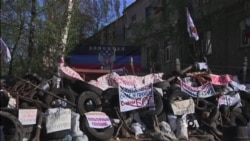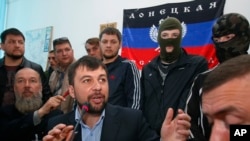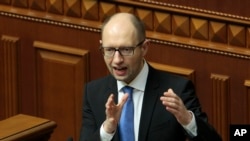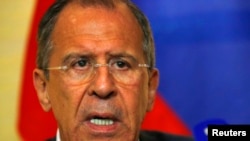The United States says Russia has a "responsibility" to call on pro-Russian militants occupying government buildings in eastern Ukraine to evacuate.
State Department spokeswoman Jen Psaki said Friday that if Russia does not take steps to de-escalate the situation and implement Thursday's deal with Ukraine, aimed at lowering tensions, there will be "consequences."
Militant leader Denis Pushilin said earlier that his men are not bound by the deal and will only stand down after the Ukrainian government resigns.
Psaki said the U.S. rejects those comments and the separatists' claim that the new Ukrainian government took power in a coup.
Thursday's agreement followed talks between Ukraine, Russia, the United States and the European Union. It calls for all government buildings to be evacuated and for the militants to be disarmed.
But it includes few concrete measures for ending the crisis, and many Western leaders are skeptical about Russia holding up its end of the bargain.
Psaki told reporters Friday the U.S. believes Russia has the influence and ability to implement the accord, noting what she described as a "clear and strong connection" between the separatists and Russia. But she said the U.S. is "clear-eyed" about Russia's record of not implementing steps in the past and will test over the coming days whether Russia will follow through this time.
Meawhile pro-Russian separatists are still ignoring the Geneva agreement.
Outside the regional administrative headquarters in Donetsk, music blared Friday as Russian flags flapped in the breeze.
Inside, the self-declared leader of the pro-Russian separatists, Denis Pushilin, dismissed efforts to get him and his followers to leave.
"Russia's foreign minister didn't sign for us, he signed for the Russian Federation," Pushilin told journalists.
In Kyiv, Ukrainian Foreign Minister Andriy Deshchytsia warned time was running out.
"If this will not start in a few days I think that after the Easter there will be more concrete actions," he said.
The Ukrainian government warned on Friday it could take "more concrete actions'' next week if pro-Russian separatists do not end their occupations of public buildings under the terms of an international accord.
Ukraine's acting president and prime minister on Friday issued a strong pledge to eastern Ukrainians; promising to support constitutional change, and decentralize power to local councils - allowing them to conduct business in Russian - a central demand of the separatists.
The comments by Oleksander Turchinov and Arseniy Yatsenyuk came in a joint televised address to the nation.
Earlier Friday militant leader Denis Pushilin said his men were not bound by Thursday's Geneva deal and would only stand down after the Ukrainian government resigns.
The agreement followed talks between Ukraine, Russia, the United States and the European Union, and called for all government buildings to be evacuated and for the militants to be disarmed.
Obama threatens more sanctions
U.S. President Barack Obama said Washington will continue preparing sanctions against Russia in case it does not take steps to de-escalate the situation.
"We are coordinating now with our European allies," the president said. "My hope is that we actually do see follow-through over the next several days but I don't think given past performance that we can count on that. And we have to be prepared to potentially respond to what continue to be efforts of interference by the Russians."
The White House national security advisor, Susan Rice, told reporters Friday that the U.S. has been clear that it and its European partners "remain ready to impose additional costs on Russia" if it fails to meet its obligations.
She said "in the event of a dramatic escalation," such as the movement of troops, those costs and sanctions could include targeting what she called "very significant sectors" of the Russian economy.
On Friday Russia criticized the sanctions threat calling it "completely unacceptable." A statement from the foreign ministry said U.S. officials were trying to "whitewash" what it called Kyiv's use of force against protestors in Ukraine's eastern provinces.
Analysts say the prospect of more sanctions is already hurting the Russian economy. Moscow warned this week its economy might show zero percent growth this year due to the crisis.
But many global companies are lobbying against sanctions, according to Ben Kumar, a analyst at London investment management firm 7IM.
"You have this globalization now which means that everyone is linked to everyone else," he explained. "Companies like BP - all the major energy companies are so multinational that if you start to threaten to shut down trade links they will kick up a fuss."
The West is backing threats of sanctions with a show of military force. Canada is sending six fighter planes to the region to help bolster NATO defenses.
NATO has ruled out military intervention, but says the deployment is aimed at reassuring allies in eastern Europe.
Amnesty
A joint statement from the four powers says amnesty will be granted to protesters who surrender weapons and leave the buildings, except for those found guilty of capital crimes.
Ukrainian Prime Minister Arseniy Yatsenyuk told parliament Friday that he would abide by the amnesty deal.
"I would like to mention that the government of Ukraine has already prepared a bill on amnesty," he said. "If people who illegally took weapons and captured buildings lay down weapons and release these buildings, we think that these people should be granted amnesty."
The seven-paragraph agreement does not specifically require Moscow to withdraw 40,000 troops massed on its border with Ukraine, and does not reference Russia's annexation of Ukraine's Crimean peninsula last month. It also does not obligate Moscow to hold direct talks with the interim government in Kyiv.
However, the four-party statement says monitors from the Organization for Security and Cooperation in Europe will immediately begin to put the de-escalation measures into place.
National dialogue
Russian Foreign Minister Sergei Lavrov spoke separately following the Geneva talks, saying the four parties will work to establish a broad national dialogue to ensure protection of Ukrainians' rights.
"We have no wish to put our armed troops in Ukraine, on the territory of a friendly state, on the territory where our brothers live. This goes against the core interests of the Russian Federation."
Moscow has repeatedly insisted it has the right to protect Russian speakers in Ukraine. It accuses the new Ukrainian leadership of being anti-Russian and anti-Semitic, and of threatening the rights of pro-Russians.
Pro-Russian gunmen have seized Ukrainian government buildings in nearly a dozen eastern towns and cities, while Ukrainian troops have launched operations to retake the buildings. It remains unclear how much actual fighting has taken place.
“What will happen in Ukraine is not clear. Short of a Russian invasion, Moscow seems to want decentralization,” said Evelyn Leopold, a long-time former United Nations bureau chief for Reuters news agency, and currently a contributor for Huffington Post.
“What that means is also not clear yet as the devil will be in the proverbial detail," she said.
Henry Ridgwell contributed to this report from London and Catherine Maddux with Jeff Seldin from Washington. Additional material was provided by Reuters
State Department spokeswoman Jen Psaki said Friday that if Russia does not take steps to de-escalate the situation and implement Thursday's deal with Ukraine, aimed at lowering tensions, there will be "consequences."
Militant leader Denis Pushilin said earlier that his men are not bound by the deal and will only stand down after the Ukrainian government resigns.
Psaki said the U.S. rejects those comments and the separatists' claim that the new Ukrainian government took power in a coup.
Thursday's agreement followed talks between Ukraine, Russia, the United States and the European Union. It calls for all government buildings to be evacuated and for the militants to be disarmed.
But it includes few concrete measures for ending the crisis, and many Western leaders are skeptical about Russia holding up its end of the bargain.
Psaki told reporters Friday the U.S. believes Russia has the influence and ability to implement the accord, noting what she described as a "clear and strong connection" between the separatists and Russia. But she said the U.S. is "clear-eyed" about Russia's record of not implementing steps in the past and will test over the coming days whether Russia will follow through this time.
Meawhile pro-Russian separatists are still ignoring the Geneva agreement.
Outside the regional administrative headquarters in Donetsk, music blared Friday as Russian flags flapped in the breeze.
Inside, the self-declared leader of the pro-Russian separatists, Denis Pushilin, dismissed efforts to get him and his followers to leave.
"Russia's foreign minister didn't sign for us, he signed for the Russian Federation," Pushilin told journalists.
In Kyiv, Ukrainian Foreign Minister Andriy Deshchytsia warned time was running out.
"If this will not start in a few days I think that after the Easter there will be more concrete actions," he said.
The Ukrainian government warned on Friday it could take "more concrete actions'' next week if pro-Russian separatists do not end their occupations of public buildings under the terms of an international accord.
Ukraine's acting president and prime minister on Friday issued a strong pledge to eastern Ukrainians; promising to support constitutional change, and decentralize power to local councils - allowing them to conduct business in Russian - a central demand of the separatists.
The comments by Oleksander Turchinov and Arseniy Yatsenyuk came in a joint televised address to the nation.
Earlier Friday militant leader Denis Pushilin said his men were not bound by Thursday's Geneva deal and would only stand down after the Ukrainian government resigns.
The agreement followed talks between Ukraine, Russia, the United States and the European Union, and called for all government buildings to be evacuated and for the militants to be disarmed.
Obama threatens more sanctions
U.S. President Barack Obama said Washington will continue preparing sanctions against Russia in case it does not take steps to de-escalate the situation.
"We are coordinating now with our European allies," the president said. "My hope is that we actually do see follow-through over the next several days but I don't think given past performance that we can count on that. And we have to be prepared to potentially respond to what continue to be efforts of interference by the Russians."
The White House national security advisor, Susan Rice, told reporters Friday that the U.S. has been clear that it and its European partners "remain ready to impose additional costs on Russia" if it fails to meet its obligations.
She said "in the event of a dramatic escalation," such as the movement of troops, those costs and sanctions could include targeting what she called "very significant sectors" of the Russian economy.
On Friday Russia criticized the sanctions threat calling it "completely unacceptable." A statement from the foreign ministry said U.S. officials were trying to "whitewash" what it called Kyiv's use of force against protestors in Ukraine's eastern provinces.
Analysts say the prospect of more sanctions is already hurting the Russian economy. Moscow warned this week its economy might show zero percent growth this year due to the crisis.
But many global companies are lobbying against sanctions, according to Ben Kumar, a analyst at London investment management firm 7IM.
"You have this globalization now which means that everyone is linked to everyone else," he explained. "Companies like BP - all the major energy companies are so multinational that if you start to threaten to shut down trade links they will kick up a fuss."
The West is backing threats of sanctions with a show of military force. Canada is sending six fighter planes to the region to help bolster NATO defenses.
NATO has ruled out military intervention, but says the deployment is aimed at reassuring allies in eastern Europe.
Amnesty
A joint statement from the four powers says amnesty will be granted to protesters who surrender weapons and leave the buildings, except for those found guilty of capital crimes.
Ukrainian Prime Minister Arseniy Yatsenyuk told parliament Friday that he would abide by the amnesty deal.
"I would like to mention that the government of Ukraine has already prepared a bill on amnesty," he said. "If people who illegally took weapons and captured buildings lay down weapons and release these buildings, we think that these people should be granted amnesty."
The seven-paragraph agreement does not specifically require Moscow to withdraw 40,000 troops massed on its border with Ukraine, and does not reference Russia's annexation of Ukraine's Crimean peninsula last month. It also does not obligate Moscow to hold direct talks with the interim government in Kyiv.
However, the four-party statement says monitors from the Organization for Security and Cooperation in Europe will immediately begin to put the de-escalation measures into place.
National dialogue
Russian Foreign Minister Sergei Lavrov spoke separately following the Geneva talks, saying the four parties will work to establish a broad national dialogue to ensure protection of Ukrainians' rights.
"We have no wish to put our armed troops in Ukraine, on the territory of a friendly state, on the territory where our brothers live. This goes against the core interests of the Russian Federation."
Moscow has repeatedly insisted it has the right to protect Russian speakers in Ukraine. It accuses the new Ukrainian leadership of being anti-Russian and anti-Semitic, and of threatening the rights of pro-Russians.
Pro-Russian gunmen have seized Ukrainian government buildings in nearly a dozen eastern towns and cities, while Ukrainian troops have launched operations to retake the buildings. It remains unclear how much actual fighting has taken place.
“What will happen in Ukraine is not clear. Short of a Russian invasion, Moscow seems to want decentralization,” said Evelyn Leopold, a long-time former United Nations bureau chief for Reuters news agency, and currently a contributor for Huffington Post.
“What that means is also not clear yet as the devil will be in the proverbial detail," she said.
Henry Ridgwell contributed to this report from London and Catherine Maddux with Jeff Seldin from Washington. Additional material was provided by Reuters









